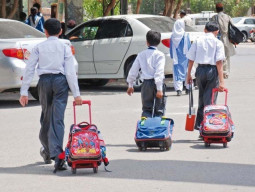
A total of 68 confirmed dengue cases in Rawalpindi during the last two days have wiped out all claims of the district administrations’ efforts regarding successful dengue prevention campaigns.
District Health Department Surveillance Officer Dr Eshan Ghani told The Express Tribune that 47 patients tested positive for dengue on Sunday, with another 21 confirmed cases on Monday.
He hoped the number of new cases will register a decline as winter sets in.
Meanwhile, Rawalpindi hospitals have not made any preparations for Ebola virus disease (EVD), as a notification has yet to be issued by the Punjab government.

The hospitals lack space, trained staff and protective gear required while caring for Ebola-affected patients.
A senior official at the Rawalpindi District Health Department told The Express Tribune that Holy Family Hospital (HFH), Benazir Bhutto Hospital (BBH) and District Headquarters Hospital (DHQ) all lack dedicated Infectious disease control wards.
HFH, the largest public hospital in Rawalpindi division, already faces a shortage of space to treat patients suffering from Crimean–Congo hemorrhagic fever (CCHF). “They will have to vacate rooms or a ward if an Ebola patient is brought to the hospital,” the official said.
There is a need to understand that Ebola patients need extra care and treatment unlike that given to patients with “ordinary” infectious diseases and we need to train staff to treat them properly, he said.
“Though the Punjab government has started training medical staff to deal with EVD, it is not up to the international standards. They have been briefed about general precautionary measures that everyone should be familiar with,” claimed the official.
There is also an acute shortage of clothing such as gloves, gowns, and goggles which necessary for medical staff to wear while treating Ebola patients, he added.
Dr Eshan Ghani said the Punjab government has asked the three hospitals to train the staff on tackling EVD patients. The government, however, has not directed hospitals to set up isolation wards. He said a PC-1 for establishing a dedicated infectious diseases ward at HFH has been approved and the work on it will start soon.
Arrangement at Islamabad hospitals
Islamabad hospitals, however, have taken some steps to deal with Ebola patients if need be. Isolations wards have been set up both at Pakistan Institute of Medical Sciences (Pims) and Polyclinic. The federal health department has not issued any directive to the hospitals so far.
Ebola symptoms
The first symptoms of Ebola are the sudden onset of fever, fatigue, muscle pain, headaches and sore throat. This is followed by vomiting, diarrhea, rashes, impaired kidney and liver function, and in some cases, internal and external bleeding. Laboratory findings include low white blood cell and platelet counts and elevated liver enzymes, according to the WHO.
Treatment
There is as no proven treatment available for Ebola. However, a range of potential treatments including blood products, immune therapies and drug therapies are currently being evaluated. No licensed vaccines are available yet, but two potential vaccines are undergoing human safety testing.
Preventive Measures
Avoid unnecessary travel to Ebola-affected places.
Wear face masks, gloves, protective clothes and goggles before coming in direct contact with an Ebola-infected person and also properly cover all open cuts on your body, especially on your hands.
Avoid contact with bodily fluids or waste from an infected person.
Thoroughly wash hands with soap after contact with an infected person. Only people who are trained to handle Ebola patients should handle the bodies of deceased Ebola victims.
Published in The Express Tribune, October 21st, 2014.


































1714129906-0/Clint-Eastwood-(1)1714129906-0-270x192.webp)






COMMENTS
Comments are moderated and generally will be posted if they are on-topic and not abusive.
For more information, please see our Comments FAQ